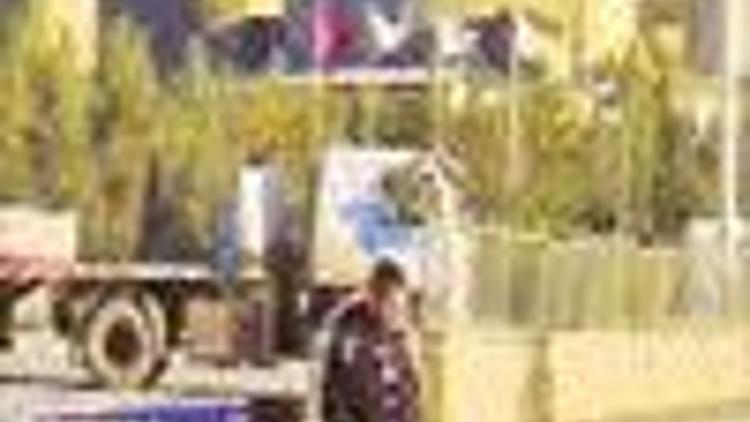Export concepts, says OYAK chief
Güncelleme Tarihi:

MARDIN - OYAK, Turkey’s leading pension fund which is active in automotive, steel, cement and energy, may ’export’the formula that made it a success over the past nine years, according to Chairman Coşkun Ulusoy. ’Imagine the name of any major private equity fund or pension fund worldwide, and I can guarantee you we are talking to them,’Ulusoy says.
At a time of plummeting exports amid global recession, the chairman of Turkey’s leading pension fund suggested a novel means to economic revival over the weekend: "export of concepts."�
Selling a Turkish business model abroad might sound a bit far-fetched. But Coşkun Ulusoy, head of the military pension fund OYAK made it clear at his annual press briefing that this was the next project up his sleeve.
"Imagine the name of any major private equity fund or pension fund worldwide, and I can guarantee you we are talking to them," Coşkun told a gathering of business reporters and editors assembled at an OYAK’s Mardin Çimento cement factory in this historic city. "We can export concepts."
At the moment, OYAK’s exports are limited to cement, steel and cars and light trucks from its Renault-Mais division. Its 50-odd companies dominant in basic industries turned a profit of $2 billion last year and despite the harsh economic environment Ulusoy predicts the group will again be profitable this year.
But, he explained, the fund’s longer-term success may well come by selling the formula that made its remarkable success over the past nine years possible. That success, he argued, is in the fund’s unique daring to eschew the passive investment strategies of comparable pension funds in favor of a strategy of taking majority interest in firms, joining the management and actually running them.
"This is a unique model of success and its also uniquely Turkish," Ulusoy told an informal three-hour gathering. "If Turkey is going to export something, let’s export this model."
Breathtaking expansion
Founded in 1961, OYAK was stable for its first 30 years and best known for its 1960s partnership with France’s Renault that became one of the country’s first carmakers and now represents a quarter of national production. But since 2000, when Ulusoy left banking to head the group, OYAK has expanded aggressively into steel, cement and energy. Its total assets have gone from just over $1 billion in 2000 to $8.2 billion today. Its 250,000 beneficiaries, including uniformed and civilian military personel, have seen their benefits more than quadruple over the same time frame.
OYAK’s first head-turning move came in 2005 when it bought a controlling interest in the public steelworks Erdemir on the Black Sea for $2.77 billion. It was quickly consolidated with a second steel works in the Mediterranean city of İskenderun and retooled with new capacity to make the combined operation Turkey’s largest steel producer and No. 6 in Europe.
A second deal to draw international attention was the sale in 2006 of a bank, OYAK Bank to ING Groep for $2.67 billion. What initially drew attention to the deal was the fact that OYAK had bought the bank just five years before out of state receivership for $36,000. In retrospect the deal is cited for its prescience; the sale came just months before the global financial system melted and the cash Ulusoy brought home is today more than the worldwide market capitalization of the Dutch group that bought it.
While today OYAK is being watched for signs of what it will do with its $3 billion in liquid reserves, Ulusoy argued the real value of the group may not be on the balance sheet. Rather, it is in the very model that underpins that success, a model used by no other fund. There are many comparable funds worldwide, usually called "secondary retirement funds" to distinguish them from the national systems to which all citizens belong. Best known is America’s largest, CalPERS, which serves 1.6 million employees and retirees of the state of California and has become a global player in financial markets.
Like virtually all such funds, its bylaws limit its investment to passive minority holdings in shares and such instruments as bonds. Those limitations were designed to protect beneficiaries from risk. But CalPERS assets, which peaked in value last year at $260 billion, have melted in the face of the crisis, plummeting by a third since last summer.
A more entrepreneurial model, one borrowing strategy from such private equity funds as the global Carlyle Group, is in fact the way forward for such group retirement funds in the very different world economy that will emerge from the current depression, Ulusoy said.
Turkey already struggles to generate enough capital formation to grow the economy and provide employment. Aggregation of other groups of employees, say teachers or police, under an OYAK-like model could be a driver of future growth, he said. The main challenge is to legally insulate the fund’s operation from political opportunism, the threat that has stymied past efforts. "You need the discipline of checks and balances and strict governance rules," he said.
Ulusoy suggested OYAK might share its example, investing with European or North American pension funds in actual business operations. One area Ulusoy said he would be keenly interested in would be mining operations which could be anywhere in the world but would help serve the raw material needs of OYAK’s companies in Turkey.
"In the past, when we have suggested that other pension funds emulate what we do, the answer has already been, ’but that’s not the paradigm,’" Ulusoy said Sunday. "My answer is that now it’s time to break that paradigm. Funds that limited themselves to paper investments with no value at the base have ... been wiped out."
OYAK has proven that an alternative to today’s international pension funds standard is possible, he argued: "In a world searching for new economic alternatives, Turkey has one that works."
David Judson is editor-in-chief of Hurriyet Daily News & Economic Review.

